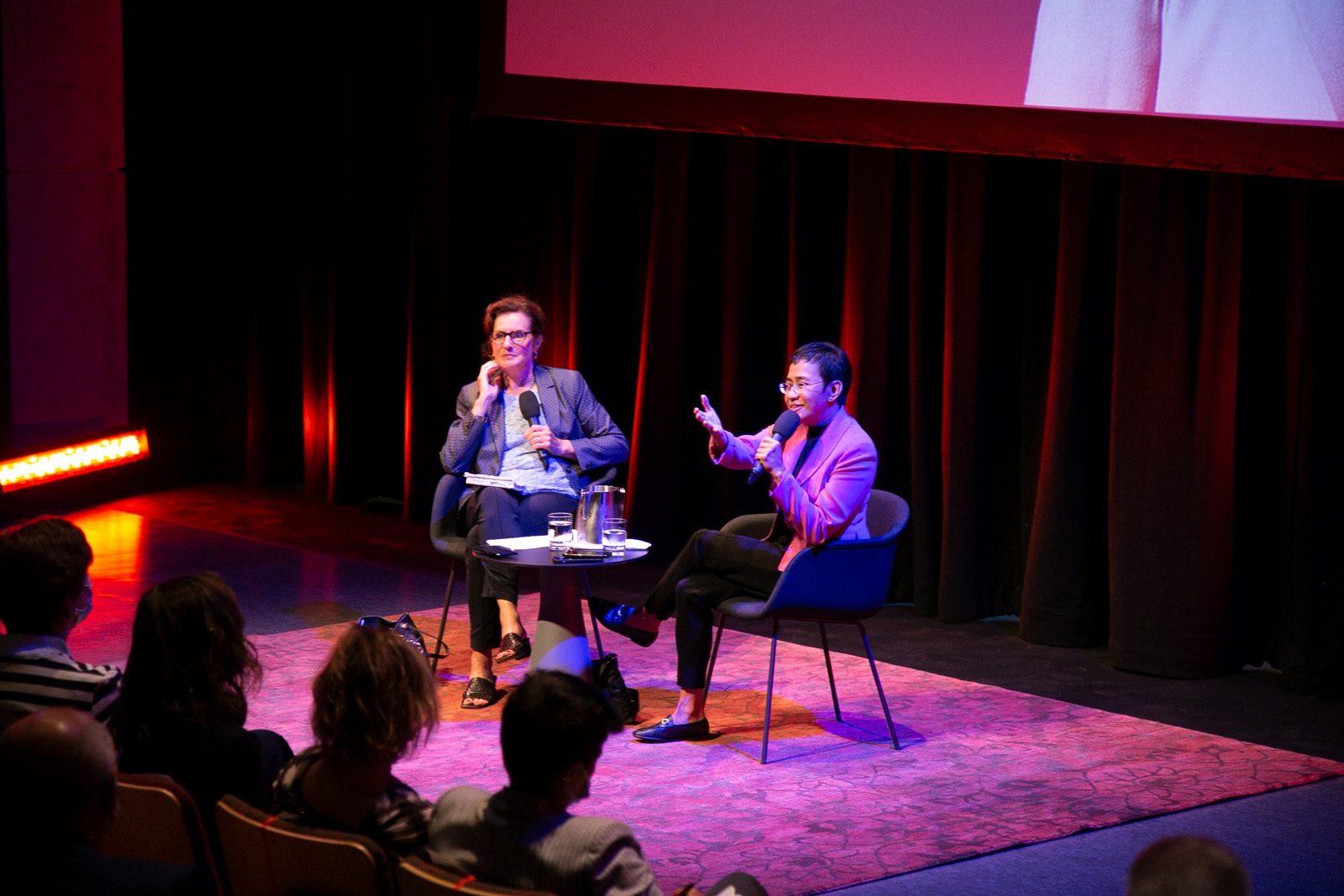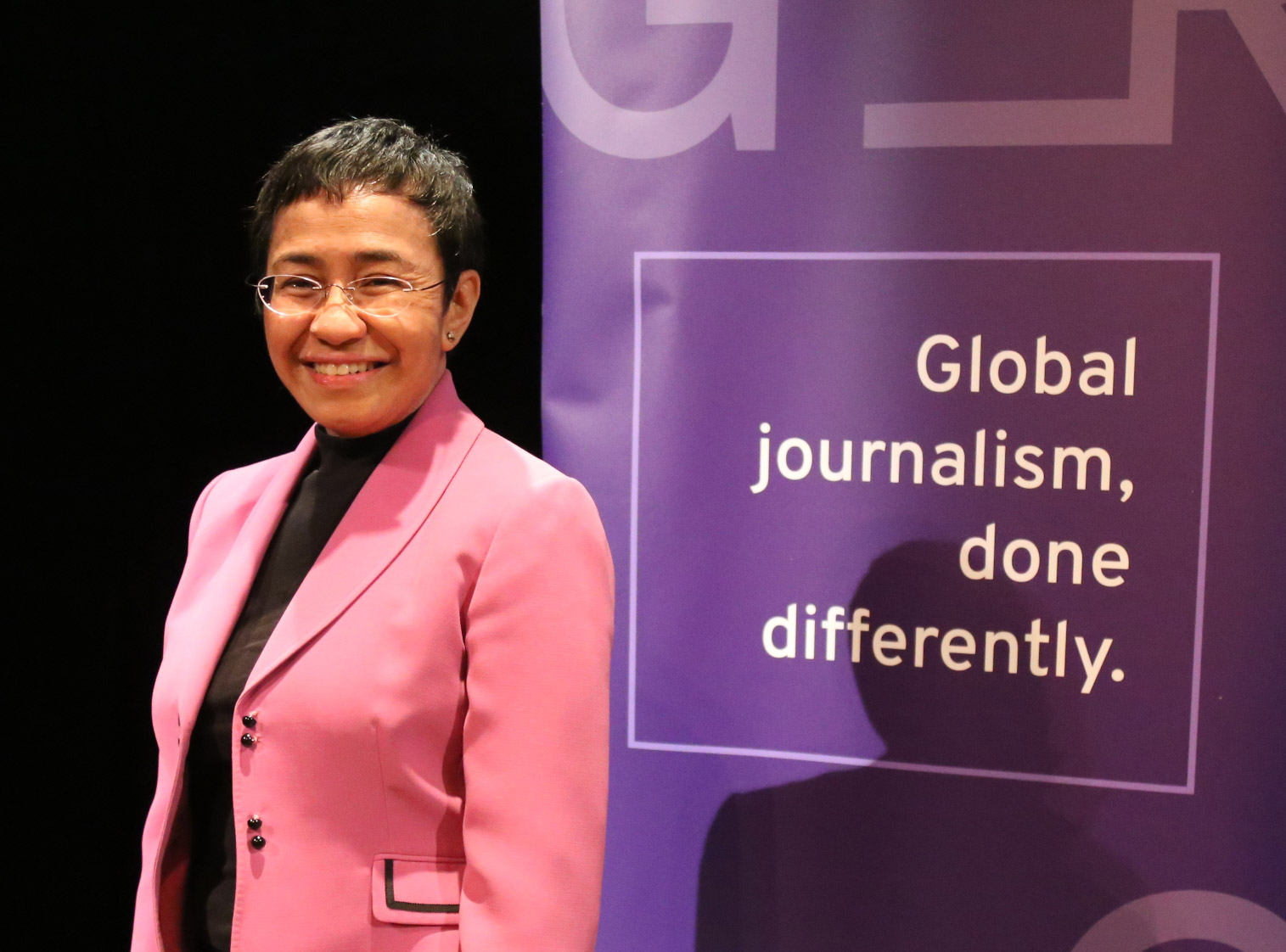In conversation with Carol Off, journalist Maria Ressa reminds us that democracy is fragile.
“Disinformation is stripping away the foundations of what made democracy — of what made journalism.”
Nobel Peace Prize laureate Maria Ressa’s words were met with rapt silence from the packed auditorium at the SFU Goldcorp Centre for the Arts on Tuesday, September 13.
The evening started off on a celebratory note, with Ressa receiving an honorary degree from SFU. “Mom and dad, are you listening?” Ressa grinned at the audience, “I was supposed to be a doctor!”
As part of the SFU Speaker Series, co-hosted by SFU Public Square, the Ouano Foundation, and the Global Reporting Centre, Ressa spoke with journalist Carol Off, former host of CBC’s As It Happens, about “how democracy dies by a thousand cuts.” This is the overarching theme of her soon to be published book, How to Stand Up to a Dictator.
The book is a retrospective on Ressa’s experience reporting on former Philippine President Rodrigo Duterte’s government and its disinformation cells. As the CEO, co-founder and President of Rappler, the country’s top digital news site, Ressa became the target of an ongoing organized harassment campaign by the Philippine government. She has since been arrested on at least seven charges related to exposing the government’s corrupt practices and was convicted of cyber-libel earlier this year. She is out on bail pending her appeal.
But the threat of a jail sentence hasn’t diminished her resolve. During the public event, Ressa highlighted the tangled threads of social media, propaganda, disinformation, and how they all combine to pose a threat to democracy.
Ressa explained how astroturfing, the practice of deceptive messaging designed to look like public sentiment, gains traction and legitimacy on social media, becoming a ‘fact’ weaponized against a target. “It’s hate on an exponential scale,” Ressa said, “something I now call behaviour modification. It’s free speech used to stifle free speech.”

Ressa explained what she sees as the key culprits — social media platforms where data collected for micro-targeting by advertisers can now be used for geopolitical power plays. Her investigations and data analysis at Rappler found that bad actors behave the same way in disinformation campaigns across the globe: in the Philippines at the height of the drug wars, in the UK during Brexit, and in the United States during the January 6th insurrection.
“They targeted both sides, pro and against, and they don’t care because they weren’t trying to make you believe in something. They were just trying to make you doubt everything.”
And this is why Ressa identifies the use of social media to spread disinformation, hate, and propaganda as the deadliest threat to democracy.
“The reason why we have democratically elected so many illiberal leaders is because our information ecosystem has been determined by the algorithmic choices of Facebook,” she said emphatically.
Midway through the conversation about fake news, alternate facts and disinformation, Off asked how journalists can continue to be watchdogs of society when their credibility is so diminished.
“‘How do we restore trust?’” Ressa repeated, “as if it’s in our power to do so,” highlighting how the industry is at the mercy of the tech platforms and lost a significant amount of autonomy when its distribution model moved to the internet.
Despite the marked somber tone that permeated the conversation — occasionally interrupted by Ressa’s humour, sharp insight, and wide grin — optimism and solutions were the focus towards the end of the discussion. On September 2, Ressa launched an action plan with nine fellow Nobel laureates, at The Nobel Peace Center’s Freedom of Expression Conference to address the world’s “information crisis.” The plan details an antitrust approach to technology platforms, pushes for data privacy, and calls to end surveillance for profit: a move that they believe would “put the guardrails in place” for democracy.

After sixty minutes of careful answers on the state of the world, Ressa’s vulnerability finally showed when Off gently enquired why she was going back to the Philippines, where if convicted, she would spend the rest of her life incarcerated. At first, Ressa brought up her fellow colleagues at Rappler, who could face the consequences in her stead. Then she reflected on her career as a journalist and what journalism meant to her.
“The baton was passed to me at a very bad time,” she laughed, “but I’m not going to drop it, and I’m going to hand it off to the next news head.”
She paused, and then her voice wavered,
“It’s because I believe in this. I believe in all of you.”
The standing ovation lasted a full minute.
Follow our work on disinformation campaigns targeting journalists here.

